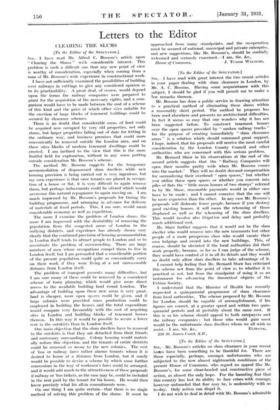Letters to the Editor
CLEARING THE SLUMS
[To the Editor of the SPECTATOR.]
have read Mr. Alfred C. Bossom's article upon " Clearing the Slums " with considerable interest. This problem is such a difficult one that any new point of view is worthy of consideration, especially when coming from a man of Mr. Bossom's wide experience in constructional work.
I have not sufficiently examined the possibilities of building over railways in cuttings to give any considered opinion as to its practicability. A great deal, of course, would depend upon the terms the railway companies were prepared to grant for the acquisition of the necessary rights, and a com- parison would have to be made between the cost of a scheme of this kind and the price at which other sites suitable for the erection of large blocks of tenement buildings could be secured by clearance schemes.
There is no doubt that considerable areas of land could be acquired now occupied by very old properties, not only slums, but larger properties falling out of date for letting in the ordinary way, and business premises that could more conveniently be removed outside the London area, and on these sites blocks of modern tenement dwellings could be erected. I am inclined to the view that this is the more fruitful field for exploration, without in any sense putting outside consideration Mr. Bossom's scheme.
The method Mr. Bossom suggests for the temporary accommodation of dispossessed slum dwellers while new housing provision is being carried out is very ingenious, but my own experience is that once tenants are placed in occupa- tion of a house or flat, it is very difficult to again remove them, but perhaps inducements could be offered which would overcome this natural repugnance to again moving on. I am mach impressed by Mr. Bossom's proposals for timing the building programme, and arranging in advance for delivery of materials at fixed periods. This, I am sure, would mean considerable economy as well as expedition.
The more I examine the problem of London slums, the more I am impressed with the desirability of removing the population from the congested areas of London to the outlying districts, and experience has already shown very clearly that the continued provision of housing accommodation in London itself tends to attract people to London and so to accentuate the problem of overcrowding. There are large numbers of men whose occupations compel them to live in London itself, but I am persuaded that a considerable portion of the present population could quite as conveniently carry on their work if they were living at a not unreasonable distance from London itself.
The problem of transport presents many difficulties, but I am sure many of these could be removed by a considered scheme of town planning, which would give more direct access to the available building land round London. The -advantage of building upon these new areas is very great, land is cheaper, more open spaces could be given, and if large colonies were provided mass production could be employed in building the houses and the total expenditure would compare very favourably with the cost of acquiring sites in London and building blocks of tenement houses thereon. In this way it would be possible to secure a lower rent in the outskirts than in London itself.
One main objection that the slum dwellers have to removal to the outskirts is that they are detached from their friends and customary surroundings. Colony housing would materi- ally reduce this objection, and the tenants of entire districts could be removed en masse to the new colonies. The cost of 'bus or railway fares rather alarms tenants whom it is desired to house at a distance from London, but it surely would be possible to devise a scheme by which some further concessions in the way of workmen's fares could be arranged, and it would add much to the attractiveness of these proposals if railway or 'bus tickets, as the case may be, could be included in the rent paid by the tenant for his house. He would then know precisely what his all-in commitments were.
On one thing I am quite certain—that there is no single 'method of solving this problem of the slums. It must be approached from many standpoints, and the co-operation must be secured of national, municipal and private enterprise, and new suggestions, like Mr. Bossom's, should be cordially welcomed and seriously examined.—I am, Sir, &c.,






































 Previous page
Previous page